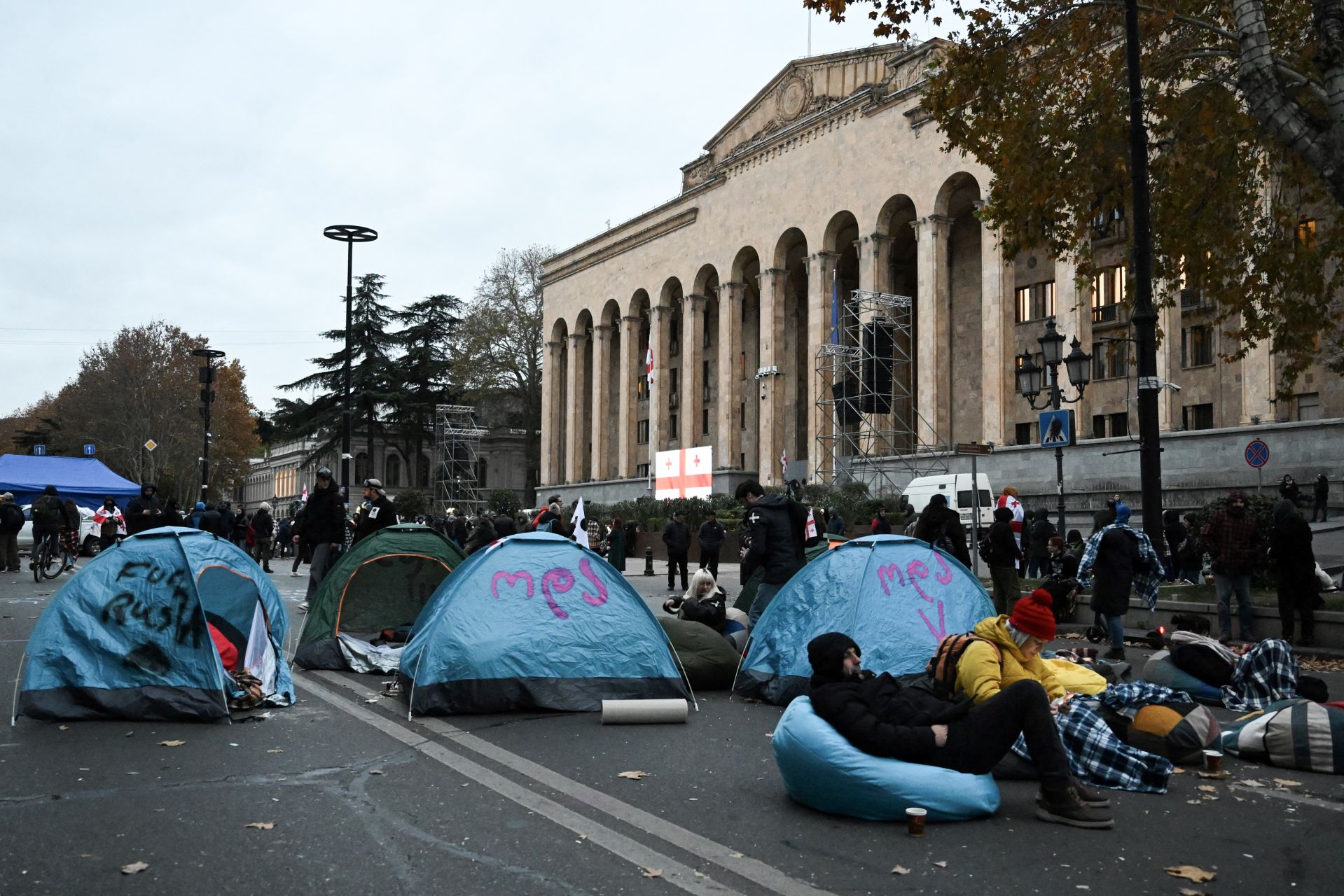- Home
- Middle East
- Georgian Parliament to Convene After Contested Vote

Protesters sit in front of tents during a protest against the results of the last month's parliamentary elections in Tbilisi on November 25, 2024, as the Parliament convene its first session. ©Vano Shlamov / AFP
Georgia's new parliament is to meet for its first session Monday amid opposition protests over an allegedly rigged election and the pro-European president demanding the result be annulled.
Nearly a month after the October 26 vote, won by the governing Georgian Dream party, political turmoil continues in the small post-Soviet country in the Caucasus.
Pro-Western opposition parties are refusing to enter the new parliament, which they deem "illegitimate."
Pro-European President Salome Zurabishvili - at loggerheads with the governing party - has filed a lawsuit with the constitutional court seeking to annul the result.
The figurehead leader has accused Russia of interference in the vote, a claim Moscow has denied, and refused to issue a presidential decree to convene the legislature.
Georgian Dream, which has secured 89 seats in the 150-member chamber, says the vote was free and fair, and parliamentary speaker Shalva Papuashvili has said lawmakers will convene even without a presidential summons.
"Parliament's first plenary session will be held on November 25 at 12:00 (0800 GMT)," he told a press conference on Friday.
Opposition parties have called for a protest rally outside the parliament building on Monday morning.
A leading constitutional law expert, Vakhushti Menabde, has said the "new parliament cannot convene until the constitutional court delivers its ruling on Zurabishvili's lawsuit."
The opposition says the Georgian Dream government is skewing the Caucasus country's foreign policy toward Russia and undermining its longstanding bid to join the European Union, an accusation the party denies.
Since the vote, tens of thousands have taken to the streets in Tbilisi to protest alleged electoral fraud.
The European Union and the United States have called for a probe into "irregularities" during the vote.
Presidential vote looms
Papuashvili said MPs in the new parliament are expected to vote for current Prime Minister Irakli Kobakhidze to continue as the head of government.
The right to nominate a prime minister is held by Georgian Dream's billionaire founder and "honorary chairman" Bidzina Ivanishvili, widely regarded as pulling the strings of power without any official government position.
MPs will also set the date for a presidential election, expected by the end of the year.
For the first time in the country's history, the next president will be elected by an electoral college consisting of lawmakers and local officials rather than by universal suffrage.
Zurabishvili is widely expected to lose office as a result of the constitutional reform adopted in 2017.
EU goal?
After the parliamentary vote, a group of Georgia's leading election monitors said they had uncovered evidence of a complex scheme of large-scale electoral fraud that swayed results in favour of Georgian Dream.
EU foreign policy chief Josep Borrell said last week the bloc "will send a mission to Georgia... and the election will have to be investigated."
"To the Georgian people... the EU will never abandon you and your fight for EU values," he said in a statement after a meeting of the EU Foreign Affairs Council.
Ahead of the elections, Brussels warned Tbilisi that the conduct of the vote would be decisive for its prospects of joining the bloc.
Georgian Dream has denied the fraud allegations and says EU membership remains "the top priority" of its government.
Irakli Metreveli, with AFP

Comments